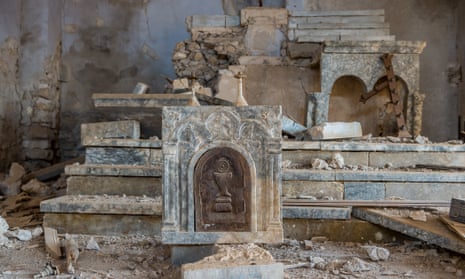A new and deadly wave of Islamist “hyperextremism” is undermining global peace and stability with an impact felt in the Middle East, Africa and the west, according to a new report that calls for urgent action to protect religious diversity.
The Religious Freedom in the World 2016 report, produced by the Catholic charity Aid to the Church in Need, says the kind of religiously motivated violence espoused by Islamic State has given rise to attacks in one in five countries worldwide over the past two years.
It argues that the “Islamist hyper-extremism” of Isis – a phenomenon whose hallmarks are systematic attempts to drive out all dissenting groups, unprecedented levels of cruelty, a global reach and the effective use of social media – is having a devastating impact around the world.
“In parts of the Middle East – including Syria and Iraq – this hyper-extremism is eliminating all forms of religious diversity and is threatening to do so in parts of Africa and the Asian subcontinent,” says the report. “The intention is to replace pluralism with a religious monoculture.”
The study says that such violence and intolerance have been a major of cross-border migration. In June, the UN said that a record 65.3 million men, women and children had been forced from their homes by war and persecution last year, leaving one in every 113 people a refugee, internally displaced or seeking asylum.
The effects of Islamist hyperextremism are felt most keenly in the Middle East and some African countries, but the report notes that the west is far from immune. “[The phenomenon] is at risk of destabilising the socio-religious fabric, with countries sporadically targeted by fanatics and under pressure to receive unprecedented numbers of refugees, mostly of a different faith from the indigenous communities.
“Manifest ripple effects include the rise of rightwing and populist groups, restrictions on free movement, discrimination and violence against minority faiths, and a decline in social cohesion, including in state schools.”
Father Jacques Mourad, a Syriac-Catholic priest whom Isis held in Syria for five months last year, says that people of all faiths have to find a way to respect one another and their differences. In his foreword to the study, he writes: “Our world teeters on the brink of complete catastrophe as extremism threatens to wipe out all trace of diversity in society. But if religion teaches us anything, it is the value of the human person, the need to respect each other as a gift from God.”
He adds that if the cycle of violence is to be broken, “we need to replace war with peace … It is time to cast aside religious hatred and personal interests and learn to love one another, as our faiths call us to do.”
Beyond its focus on extremist Islamism, the report stresses that people of faith are suffering “a renewed crackdown” in China and Turkmenistan and are being denied their human rights in North Korea and Eritrea. It also says the situation has improved for some faith minorities in countries such as Bhutan, Egypt and Qatar over the past two years.
John Pontifex, the editor-in-chief of the study, said it was intended to serve as a wake-up call to the “evident genocidal intent” of religious hyperextremism, and urged faith groups to do more to address the hatred within their ranks. “What prospects are there for peace when powerful sections within specific faith groups have nothing but contempt for those who do not share their world-view – and who deny the right to life not just to people of other faiths, but also to moderates from among their own community?” he said.
Pontifex also said that western policymakers had to “rethink their whole outlook” and acknowledge the pivotal role that religion plays in global politics. “It’s no longer compatible to say that traditional faith practice belongs to the past when the evidence shows that for millions and million of people – a new generation – religion is at the centre of their lives, driving everything they do,” he said.
